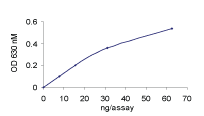
PTPN12 (PTP-PEST), Active(P39-21G)
FOR BULK ORDER REQUESTS PLEASE CONTACT US
Description :Recombinant human PTPN12 (1-355) was expressed in E. coli cells using a N-terminal GST tag.
Species :Human
Tag :GST tag
Expression System:E.coli
Sequence :1-355
Genbank Number :NM_002835
Specific Activity :Sample Enzyme Activity Plot. For specific information on a given lot, see related technical data sheet.
Purity :Sample Purity Data. For specific information on a given lot, see related technical data sheet. 
Storage, Stability and Shipping :Store product at –70oC. For optimal storage, aliquot target into smaller quantities after centrifugation and store at recommended temperature. For most favorable performance, avoid repeated handling and multiple freeze/thaw cycles.
Applications :Phosphatase Assay, Western Blot
Molecular Weight :~66kDa
Gene Aliases :PTP-PEST, PTPG1, tcag7.1075
Scientific Background :Protein tyrosine phosphatase-PEST (PTPN12), a ubiquitously expressed cytoplasmic tyrosine phosphatase, is thought to play an important role in cell adhesion and motility, cell migration, and signal transduction for antigen receptors in B and T lymphocytes (1). Signal transduction via tyrosine phosphorylation, normally fine-tuned by the concerted action of both protein tyrosine kinases and protein tyrosine phosphatases (PTPs), is a key mechanism in tumorigenesis. Studies suggest potential role for PTP-PEST in regulation of p130(cas) in mitogen- and cell adhesion-induced signaling events (2).
References :
1. Angers-Loustau, A. et al: Protein tyrosine phosphatase-PEST regulates focal adhesion disassembly, migration, and cytokinesis in fibroblasts. J. Cell Biol. 1999; 144: 1019-31.
2. Garton, A.J. et al: Identification of p130(cas) as a substrate for the cytosolic protein tyrosine phosphatase PTP-PEST. Mol. Cell Biol. 1996; 16(11):6408-18.
Product Sheets (By Lot #) :
Research Areas :Cancer, Cardiovascular Disease, Cellular Stress, Invasion/Metastasis, Phosphatases, Cancer, Inflammation, Metabolic Disorder, JAK/STAT Pathway, WNT Signaling, Invasion/Metastasis, Phosphatases
